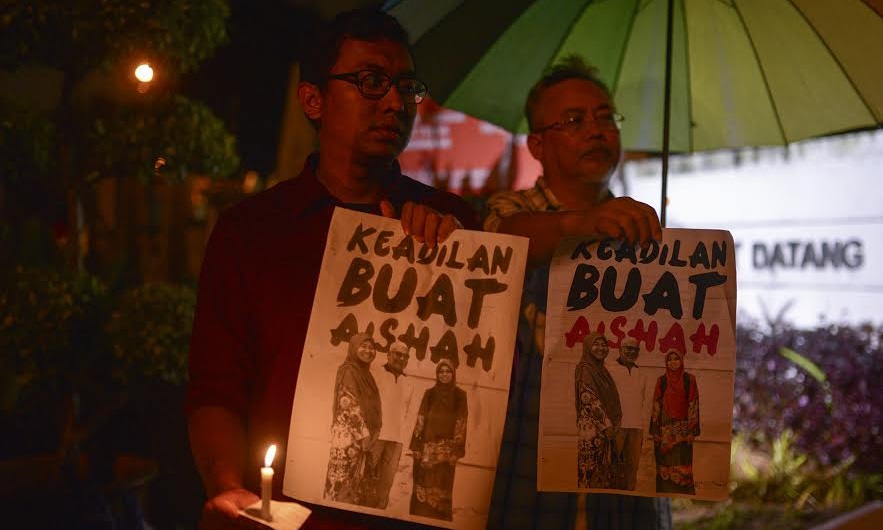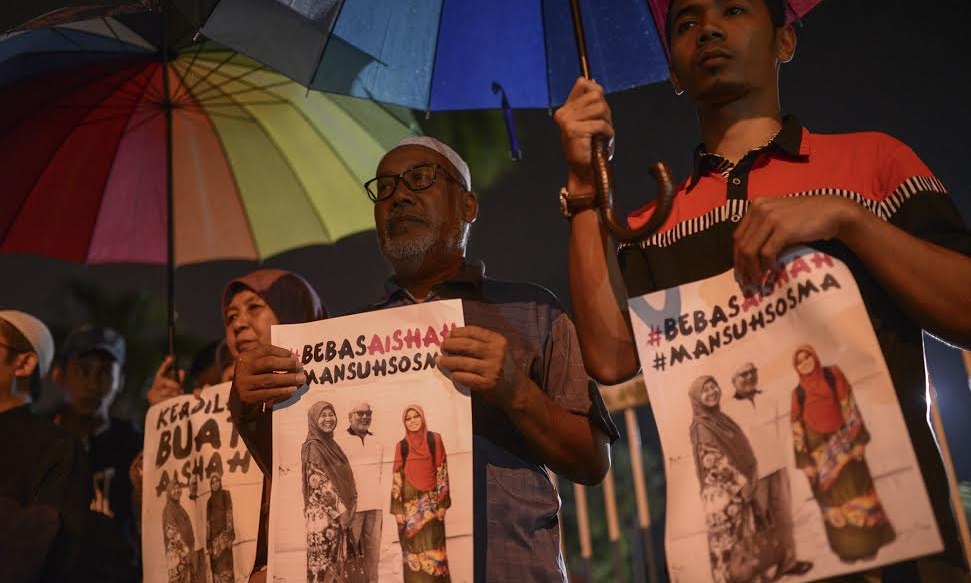Human Rights Defenders can speak up and act, and the Media has the capacity of making these voices heard.Positive results can sometimes be achieved - and this is one of them when the government decided to amend the proposed law and return the full discretion when in comes to sentencing to judges - no more the need for 'discretion only if the Public Prosecutor gives the green light'. We await the tabling of these amendments to the Bill, which the Minister assured us will be done during the 2nd reading...
U-turn death penalty for drug traffickers

PUTRAJAYA today caved in to public pressure and will return full
discretion to judges to mete out the death sentence to drug traffickers.
Minister in the Prime Minister’s Department Azalina Othman Said said
in a statement today the government will amend a controversial clause in
the Dangerous Drugs Bill (Amendment) 2017.
“The government will carry out an amendment at the committee stage to
Section 39B of Act 234 (Dangerous Drugs Act) to give full discretion to
the judiciary,” she said.
The Dewan Rakyat secretary has been notified about the amendment to
the bill, which is expected to be tabled for second reading tomorrow,
she said.
A clause in the original bill, tabled last Thursday, gave
unprecedented powers to public prosecutors to issue a written
certification to convicted drug traffickers who helped enforcement
authorities to disrupt drug distribution activities within or outside of
Malaysia.
Judges could then decide whether to spare these convicts the mandatory death penalty.
However, the judges would have no choice but to mete out the
mandatory death sentence to convicts without a written certificate from
prosecutors.
Various parties, including the Malaysian Bar, opposition MPs and human rights group
Malaysians Against Death Penalty and Torture, have criticised the
controversial clause over the past week, saying that it interferes with
the judges’ sentencing power.
Azalina said the decision to amend the bill was made after taking
into account the views and suggestions of all stakeholders to the
government.
“This amendment demonstrates the government’s
openness, especially the prime minister who always listens to views from
various parties to ensure every policy decision is made inclusively,” she said.
Attorney-General Mohamed Apandi Ali blamed the cabinet today for
adding the caveat to give prosecutors the power to issue a written
certification to convicted drug traffickers.
“My initial proposal was to give discretion to judges, that is, to
pass a death sentence or otherwise. That was my principal advice.
“The certification (by public prosecutors) is another policy matter by the cabinet... I don’t have a say in it,” Malaysiakini reported him as saying. – November 29, 2017, Malaysian Insight
Malaysian Insight also carried MADPET's statement
Public prosecutor granted ‘too much power’ over life and death, says human rights group
A HUMAN rights group is critical of an amendment to the law
governing the death penalty, saying it gives too much power to the
public prosecutor over the judge in determining who deserved to be
sentenced to death.
Yesterday, the bill for the Dangerous Drugs (Amendment) Act 2017 was
tabled in Parliament, amending Section 39B of the Dangerous Drugs Act
1952, which pertains to the death penalty. The new law would allow the
judge to exercise discretion in meting out life imprisonment instead of
the death penalty, which was previously mandatory for those convicted of
drug trafficking.
However, a clause states that the judge may impose a sentence other
than the death penalty, only if and when the "public prosecutor
certifies in writing to the court, that in his determination, the person
convicted has assisted an enforcement agency in disrupting drug
trafficking activities within or outside Malaysia."
"It is wrong to give the public prosecutor the power to decide who
dies and who may live," Malaysians Against Death Penalty and Torture
(Madpet) coordinator Charles Hector said in a statement today.
"Remember, that he is also responsible for prosecution in a criminal
trial, and the power to the public prosecutor to give or not give the
written certification is most dangerous. It may also undermine the right
to a fair trial."
According to the proposed amending act, if the public prosecutor does
not provide the certification, judges will have no choice but to impose
the death penalty.
Hector said the power of sentencing should rest with the judge alone.
"The existence of appeals to higher courts helps ensure that there be no errors."
Before sentencing, the judge usually hears and considers the
submissions of the prosecution and the convicted person to impose an
appropriate sentence.
"Thus, the question of whether there was assistance or not could be
included as one of the listed matters that should be considered by the
judge before he decides and pronounces sentence."
"Some may have no information or very little information, or maybe
that information and/or assistance will not help disrupt drug
trafficking activities. As, such this really should be for the judge to
decide and maybe should be a point to be considered before sentencing."
In a statement today also condemning the law amendment, Lawyers for
Liberty executive director Eric Paulsen said there was little guarantee
that the law enforcement agencies and public prosecutor would not abuse
such "unfettered and arbitrary power".
"It is basic that the act of prosecution is an executive function of
the state and the office of the public prosecutor shall be strictly
separated from judicial functions. Therefore it would be a serious
miscarriage of justice if the prosecutor could also decide the mode of
punishment, and all the so, the punishment of death," he said.
By compelling judges to impose a life or death sentence based on the
public prosecutor’s certification is an "unnecessary fetter" on their
discretion and interferes with judicial independence and justice,
Paulsen said.
As of March, there are almost 800 prisoners on death row for drug
trafficking offences under Section 39(B), according to Prison Department
statistics.
Madpet has called for all death sentences to be commuted to
imprisonment. It further calls on the government to impose a moratorium
on pending executions and speed up efforts towards the abolition of the
death penalty. – November 24, 2017, Malaysian Insight.
MADPET's Full Statement - MADPET - JUDGE’S DISCRETION TO NOT IMPOSE DEATH PENALTY ONLY IF PUBLIC PROSECUTOR GIVES CERTIFICATION IS WRONG
**Thereafter several human rights groups, including the Malaysian
Bar, and even Opposition MPs raised concerns about the said Bill, being
debated at the Dewan Rakyat(House of Representatives) in Malaysian
Parliament.
















